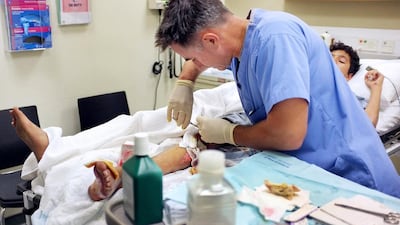Major privatisations are planned in Abu Dhabi’s healthcare sector.
“We are being mandated that over time, and fairly quickly, we will have to change the entire operational profile of Abu Dhabi Health Services [Seha],” said Harris Allen, the deputy group chief financial officer at Seha. “Part of that is that we will drop dramatically in volume.
“Seha will now start doing … more aggressively what we didn’t do for the first seven years [and] start to move on privatisations,” Mr Allen said.
He declined to state which assets Seha planned to privatise.
“If you look at the decree to create Seha, it was mandated to be at the front end of the transition to privatisation,” he said. “But in the past six months, all that is back on the table.”
Seha, launched in 2007, manages all public hospitals and clinics in the emirate, accounting for almost 70 per cent of Abu Dhabi’s healthcare sector. It operates eight hospital brands including Al Gharbia Hospitals, Tawam Hospital and Sheikh Khalifa Medical City, as well as a large number of primary-care clinics.
Seha has 100 per cent of the dialysis market and a significant share of the mobile clinic segment.
Government-subsidised Seha hospitals treated 61 per cent of inpatients and 38 per cent of all hospital outpatients last year, according to the Health Authority of Abu Dhabi (Haad).
“We currently see lots of patients we don’t need to see,” Mr Allen said. State-run emergency care services are feeling the pressure as patients with minor ailments clog acute care facilities, The National reported on June 3.
“[Privatisation] raises a tonne of questions,” he said. “It’s nice to say Seha will get out of particular businesses. But if particular services are going to go to the private sector, [this will have] to be in sync with government policy and regulation.”
Haad and Daman, the national insurance company, will have to create new payment systems to ensure there is an incentive for private companies to enter particular sectors, Mr Allen said.
“On a lot of the services Seha provides for the sickest patients, we lose money and we will always lose money,” he said.
Therefore, higher reimbursements will be needed if these services are to be successfully spun off.
“The strategy of the government of Abu Dhabi is to aggressively start moving towards growing the private sector and giving patients choice,” Mr Allen said.
Haad has identified skill and capacity gaps in a number of medical segments, including critical and emergency care, paediatrics, oncology, rehabilitation and psychiatry.
abouyamourn@thenational.ae

